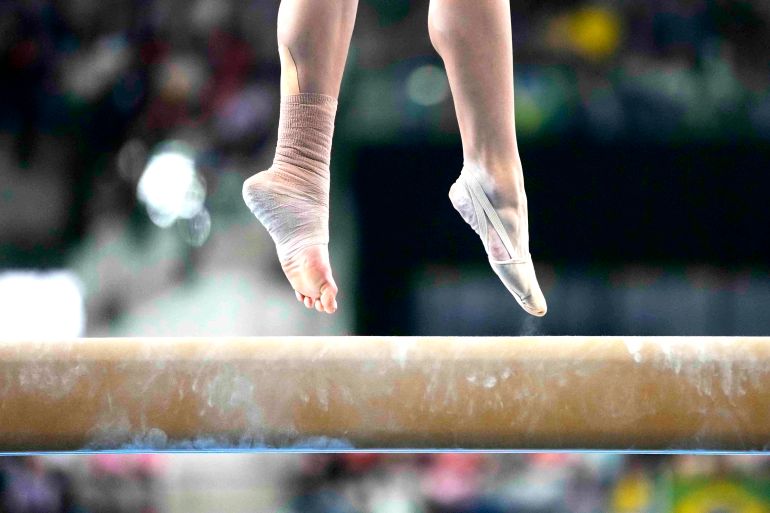British Gymnastics bans coaches from weighing young athletes
No gymnasts aged 10 or under can be weighed under new rules aimed at stamping out ‘harmful practices’.

British Gymnastics has introduced new safeguarding rules that will prevent coaches from weighing athletes in an effort to stamp out methods it said are “on the fringe of abuse”.
The rules – to which gyms must adhere or face sanctions – are part of a series of policies that the governing body is introducing following the 2022 Whyte Review, which found there was “systemic” physical and emotional abuse within the sport.
Keep reading
list of 4 itemsGymnastics Ireland ‘deeply sorry’ to Black girl ignored at medal ceremony
IOC allows Paris Olympics participants to wear hijabs at athletes’ village
US athletes allege hazing abuse at Northwestern University
British Gymnastics has said it intends to go beyond the recommendations of that report in order to stamp out “harmful practices”.
Under the new rules, no gymnasts aged 10 or under can be weighed. Gymnasts between the age of 10 and 18 can only be weighed with with the consent of a parent or guardian. And those above the age of 18 can only be weighed with their consent.
If athletes are weighed, it must be done by a sports science or medical practitioner, with a “scientifically valid rationale” for it, including measuring growth or designing strength and conditioning exercises.
British Gymnastics said the policy had been introduced “to prevent inappropriate practices and prevent potential areas of concern around weighing, due to some of the related psychological distress and risks of the development of mental health problems such as eating disorders/disordered eating, anxiety, and depression”.
“Inappropriate or excessive weighing of gymnasts is an example of poor practice which may be on the fringe of abuse, and if/or repeated could amount to abuse,” it added.
We're proud to launch our 3️⃣ new policies, derived from the themes within the Whyte Review.
The new policies and guidance will support the community to create the best environment for all gymnasts to thrive.
See our dedicated webpage 👉 https://t.co/RUPgYKzdtr#BeTheChange pic.twitter.com/ezq9FUutOQ
— British Gymnastics (@BritGymnastics) November 29, 2023
‘No desire to put medals above welfare’
In a statement, British Gymnastics chief executive Sarah Powell said: “Above all else, we care about gymnasts as people, and these new policies make clear that what matters most in gymnastics is the welfare of those involved.
“While practices have moved on a long way, we know there has been poor practice in these areas and so by providing clarity for gymnasts, parents and carers, coaches, clubs, volunteers and officials through the statements set out in these policies it will ensure everyone understands what is OK and what is not OK and help prevent that happening in the future.”
Powell said there was “no desire for us to put medals above welfare”.
The Whyte Review focused on the period from 2008 to 2020 and received more than 400 submissions. Of those, more than 40 percent described physically abusive behaviour towards gymnasts from coaches.
Gymnast Eloise Jotischky told the BBC that “weighing was used as a punishment”.
In June 2022, Jotischky became the first gymnast – and to this date, the only gymnast – to win a civil case against British Gymnastics for the abuse she experienced between 2016 and 2018 from coach Andrew Griffiths, who is now banned from coaching.
Among the British Gymnastics’ new rules, a new hydration rule states that preventing an athlete from drinking water or going to the toilet is “physical abuse”.
And children under the age of 12 can no longer be taken out of school to train, while those over 12 can only miss school in “exceptional circumstances”.
British Gymnastics’ previous safeguarding interventions had not been mandatory.